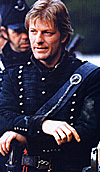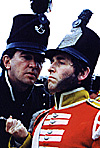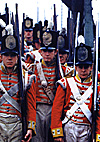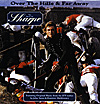Richard has been a member of the Napoleonic Association for sixteen
years, and has an established tremendous theoretical knowledge of the
Napoleonic period, complemented with a vast practical experience. A
muzzle-loader from an early age, he designed or made all of the principal
weapons in the series, and trains actors and extras alike for their roles in
'Sharpe'. For use overall in the Sharpe series, he has trained over a thousand
extras. He appears in the series as 'Rifleman Moore', one of Richard
Sharpe's Chosen Men, and is the brains behind the brawn.
"Regiment" had overshadowed the last bits of filming on Sharpe
series three. We had already begun to plan for this as early as August 1994,
and I had amassed and submitted to the production office a good deal of
script and photos on the reenactment sections of period soldiery
associations in England, in the hope that the spark of my confidence and
hopes would find a lodging in the script writer's head and be fanned into
flame as I prompted thoughts of including almost impossible things using
extras, but familiar to re-enactors, in the initial scripts. Most reenactment
groups responded favourably to my mailshot (except for one who made
impossible demands as a condition of participation) so I was able to say
that if we used re-enactors as a whole for the extras, we would have enough
people for all the prospective scenes.
Due to the part I'd already played in 'Sharpe", the producers
generously allowed me free rein in arranging for the members of these
groups, all with similar backgrounds to me, to come and take part in the
film. All we had to do now was fix it so we got the best out of them and 'in
the can'.
"Regiment" is a screenplay based on the novel. Richard Sharpe
returns from the war to find out what has happened to his replacements,
which have suddenly dried up, threatening the existence of his regiment, the
South Essex. Finding no men at the depot, he sets out to uncover the web
of deceit, corruption and subterfuge; find his men; and get them over to
Spain to take part in the invasion of France . . . how he does this I'll not
relate here - I shan't spoil a good story!
We needed to recreate sets to film on; the South Essex Barracks,
the training camp at Foulness, several dark and dingy rooms, and good
locations for the marching sequences. This you may think is easy; but add
power lines, modern roofs, tv aerials, traffic noise, aeroplanes, and all the
other modern distractions it isn't!
The training sequences were shot at Mapledurham on the river
Thames. The re-enactors, finding the costumes and kit very familiar and (after a short period of camera-shyness) soon swung into action with a little help from me, gaining confidence, and giving a great performance enabling us to fill full frames time after time again with quality shots. The principal actors were very impressed, and the military atmosphere certainly helped them in their performances. We began to realise after a short time that we were creating
a work of outstanding quality, and setting new standards for the portrayals
of period soldiery on television. All that was left to do before we left for
Turkey to continue the series overseas, was the sub-climax of the film . . .
Scene 147
Scene 147 was set at an outside theatre, and in the presence of the Prince of Wales. He was to walk between an Honour Guard of representatives from the British Army before sitting down to enjoy the performance. After the excellent support of the re-enactors, I suggested that
they should now play these representatives, but using their own men and their own uniforms, as they are seen in re-enactment displays around the country, as my thank-you and acknowledgement of the part they'd played. This was agreed, and the scene was rewritten by me to include these units. What happened? Wait and see!
The other episodes this year are "Sharpe's Mission" (an original screenplay), and "Sharpe's Seige". So what is next ? The biggest, loudest, dirtiest clap of blackpowder thunder that slammed the door on the Napoleonic Wars, the end of the road we're marched towards for five years . . . Sharpe's Waterloo! ! !
This article appears in MagWeb (Magazine Web) on the Internet World Wide Web. In September 1995, the 2nd Battalion of the South Essex
Regiment marched into Tilbury Fort. The place has seen in it's history a
lot of comings and goings, but for one small soldier there, it was, despite
the rain and the gloom, a delightful day. This was, of course, me - and
after four years of working on 'Sharpe' my dream had come true . . . we
were filming in England, using re-enactors as the soldiers, playing the
troops in the film, "Sharpe's Regiment" .
In September 1995, the 2nd Battalion of the South Essex
Regiment marched into Tilbury Fort. The place has seen in it's history a
lot of comings and goings, but for one small soldier there, it was, despite
the rain and the gloom, a delightful day. This was, of course, me - and
after four years of working on 'Sharpe' my dream had come true . . . we
were filming in England, using re-enactors as the soldiers, playing the
troops in the film, "Sharpe's Regiment" .
 Sharpe's Regiment
Sharpe's Regiment

 With grateful acknowledgements to:
With grateful acknowledgements to:
Back to Age of Napoleon No. 20 Table of Contents
© Copyright 1996 by Partizan Press.
Other military history articles and gaming articles are available at http://www.magweb.com